Abstract
Hyperphenylalaninaemia is likely to have occurred in many infants fed the intravenous amino acid solution Vamin 9. In this study of 336 preterm infants plasma phenylalanine was measured weekly during their hospital stay. Reference data on plasma phenylalanine were prepared for 243 infants who did not receive Vamin. Only 1% of these infants had a peak plasma phenylalanine concentration greater than 150 mumol/l (maximum 202 mumol/l) compared with 23% in 93 infants fed Vamin 9, seven of whom had concentrations > 300 mumol/l (maximum 704 mumol/l). High concentrations only occurred when the total energy to protein energy ratio in the intravenous solutions decreased to less than 8.5:1 and always occurred with a ratio less than 6.5:1, implying that hyperphenylalaninaemia may be minimised with an intravenous energy intake of greater than 34 kcal (142 kJ)/g protein. Nevertheless, follow up at 18 months post-term showed that increased plasma phenylalanine in this instance was not associated with any impairment of the Bayley mental development index (or subscales including fine motor, cognitive, or language development), the psychomotor development index, or the social maturity quotient. Thus, despite theoretical concern, an adverse outcome after hyperphenylalaninaemia induced by intravenous feeding has not been observed.
Full text
PDF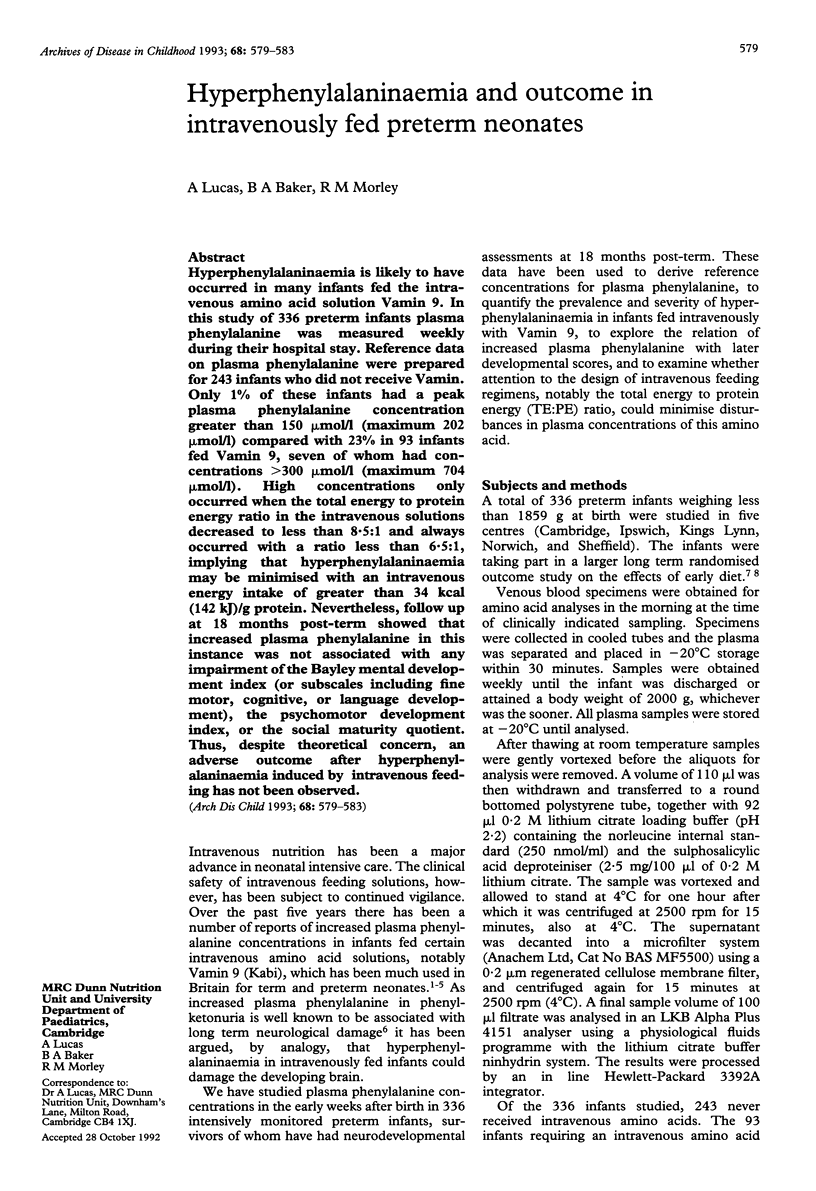
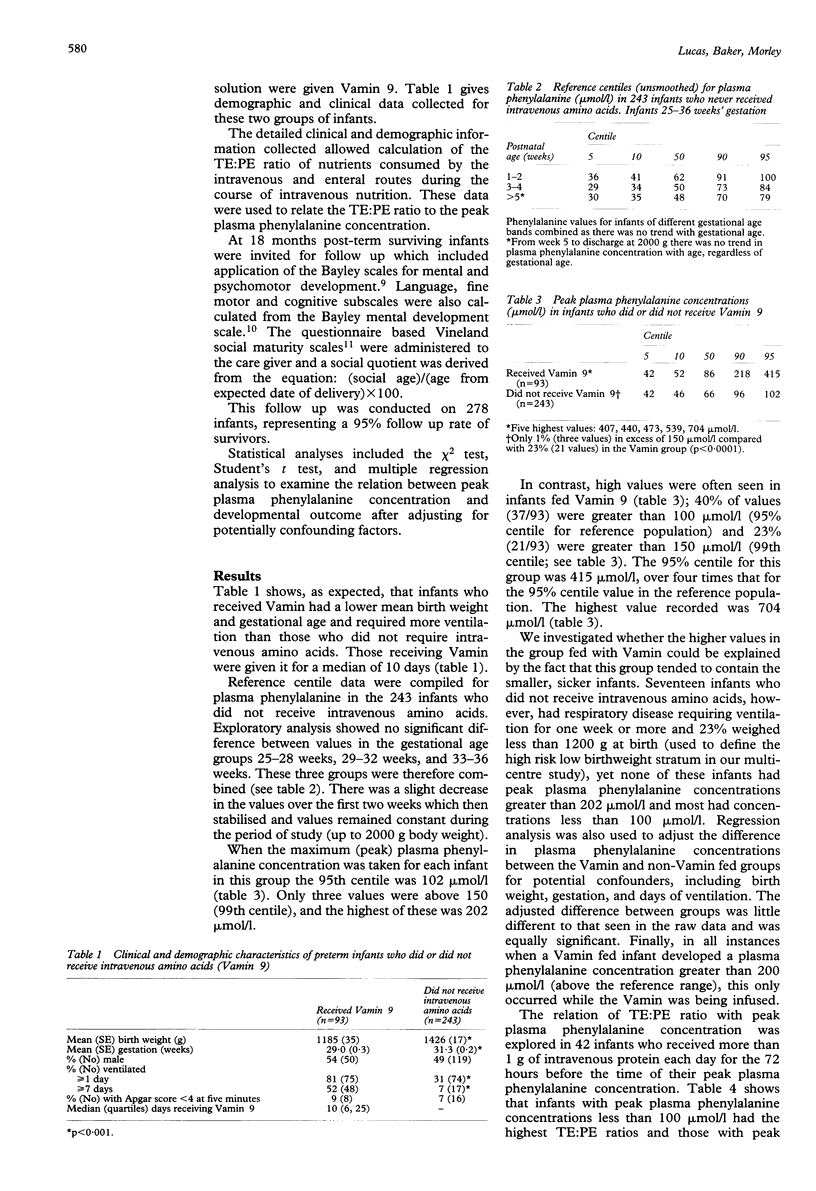
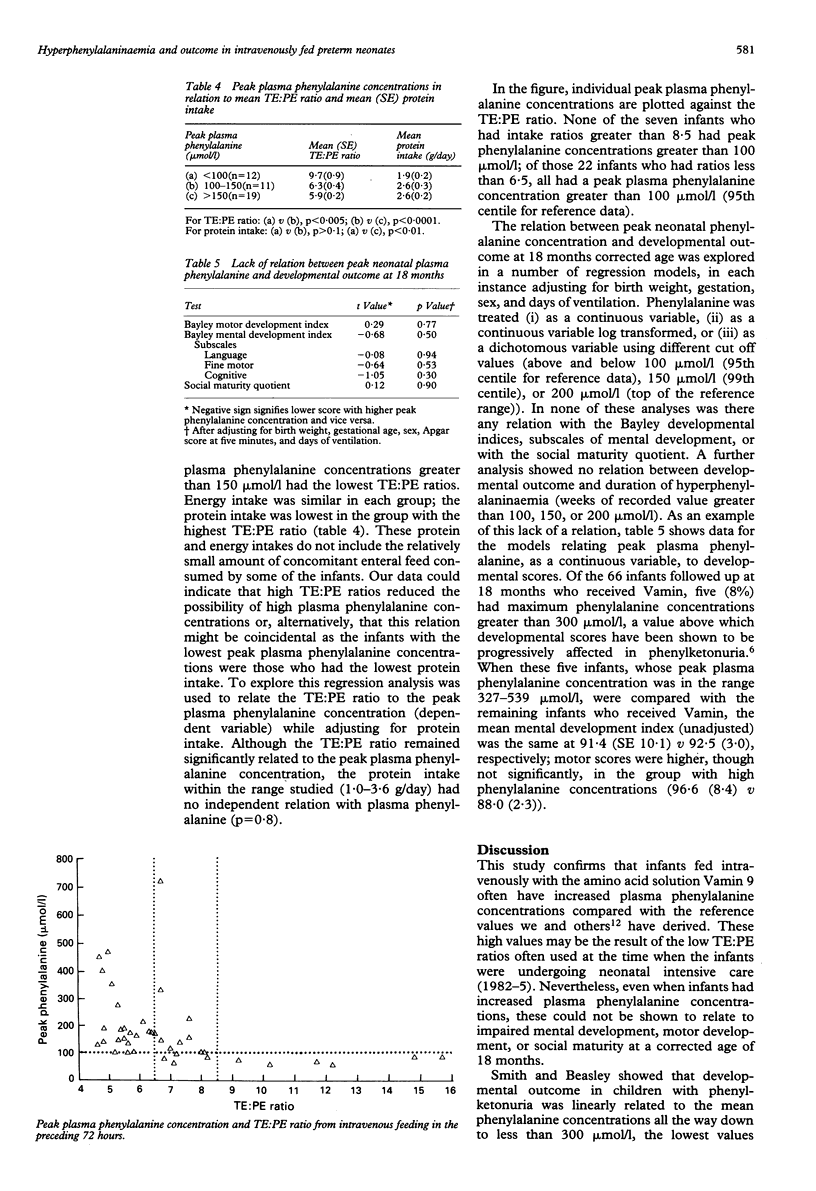
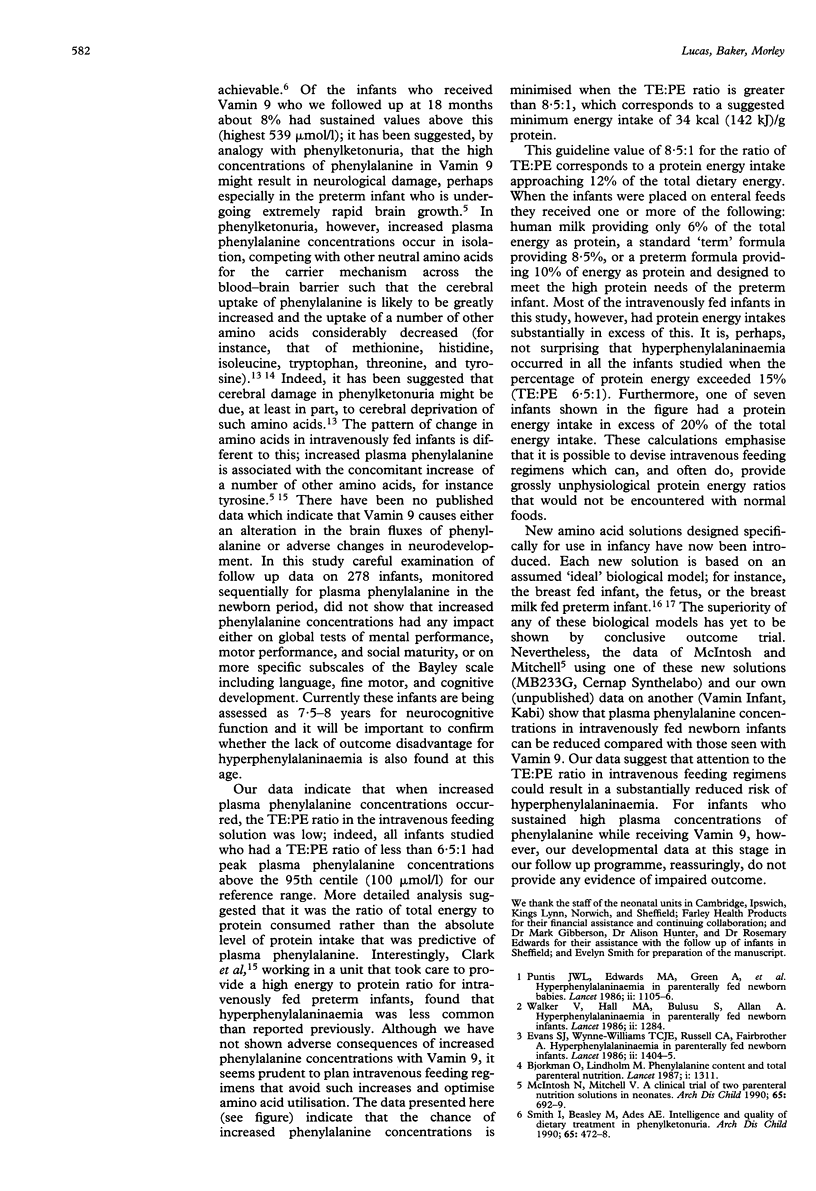
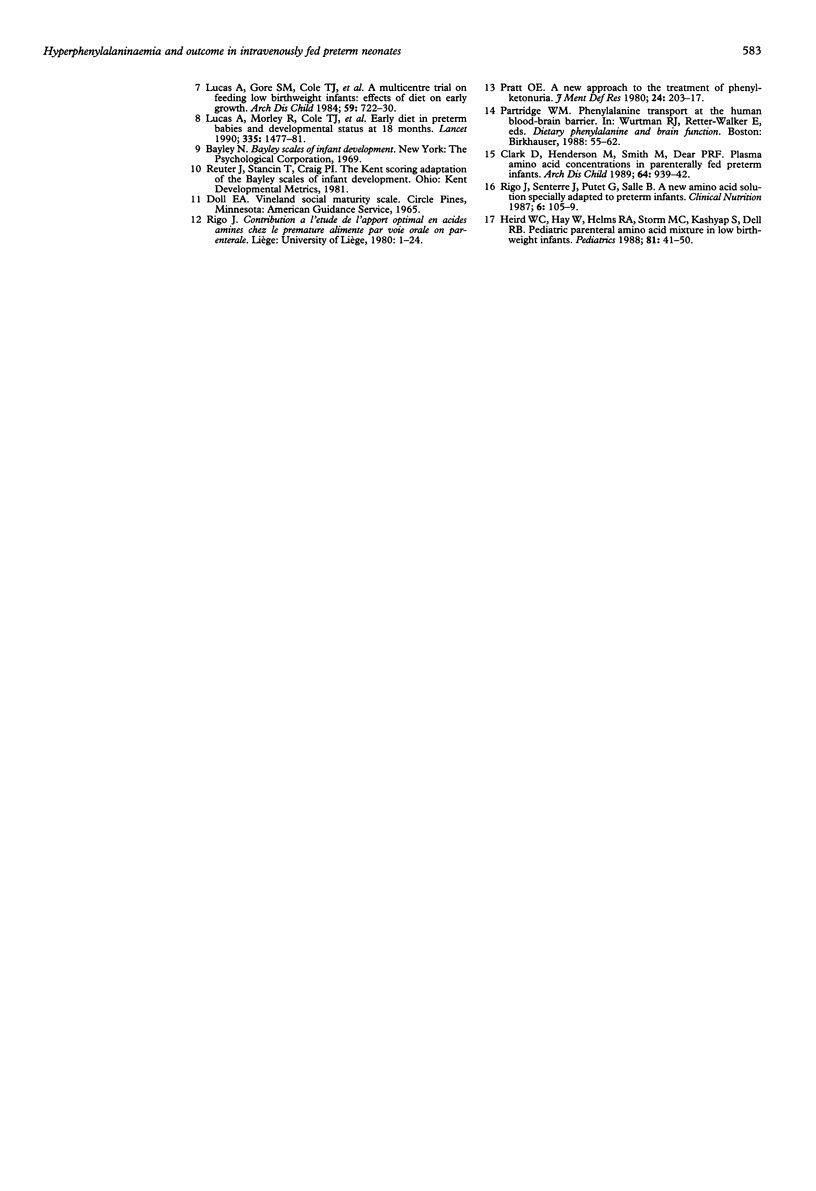
Selected References
These references are in PubMed. This may not be the complete list of references from this article.
- Björkman O., Lindholm M. Phenylalanine content and total parenteral nutrition. Lancet. 1987 Jun 6;1(8545):1311–1311. doi: 10.1016/s0140-6736(87)90558-7. [DOI] [PubMed] [Google Scholar]
- Clark D., Henderson M., Smith M., Dear P. R. Plasma amino acid concentrations in parenterally fed preterm infants. Arch Dis Child. 1989 Jul;64(7 Spec No):939–942. doi: 10.1136/adc.64.7_spec_no.939. [DOI] [PMC free article] [PubMed] [Google Scholar]
- Evans S. J., Wynne-Williams T. C., Russell C. A., Fairbrother A. Hyperphenylalaninaemia in parenterally fed newborn babies. Lancet. 1986 Dec 13;2(8520):1404–1405. doi: 10.1016/s0140-6736(86)92053-2. [DOI] [PubMed] [Google Scholar]
- Heird W. C., Hay W., Helms R. A., Storm M. C., Kashyap S., Dell R. B. Pediatric parenteral amino acid mixture in low birth weight infants. Pediatrics. 1988 Jan;81(1):41–50. [PubMed] [Google Scholar]
- Lucas A., Gore S. M., Cole T. J., Bamford M. F., Dossetor J. F., Barr I., Dicarlo L., Cork S., Lucas P. J. Multicentre trial on feeding low birthweight infants: effects of diet on early growth. Arch Dis Child. 1984 Aug;59(8):722–730. doi: 10.1136/adc.59.8.722. [DOI] [PMC free article] [PubMed] [Google Scholar]
- Lucas A., Morley R., Cole T. J., Gore S. M., Lucas P. J., Crowle P., Pearse R., Boon A. J., Powell R. Early diet in preterm babies and developmental status at 18 months. Lancet. 1990 Jun 23;335(8704):1477–1481. doi: 10.1016/0140-6736(90)93026-l. [DOI] [PubMed] [Google Scholar]
- McIntosh N., Mitchell V. A clinical trial of two parenteral nutrition solutions in neonates. Arch Dis Child. 1990 Jul;65(7 Spec No):692–699. doi: 10.1136/adc.65.7_spec_no.692. [DOI] [PMC free article] [PubMed] [Google Scholar]
- Pratt O. E. A new approach to the treatment of phenylketonuria. J Ment Defic Res. 1980 Sep;24(3):203–217. doi: 10.1111/j.1365-2788.1980.tb00074.x. [DOI] [PubMed] [Google Scholar]
- Puntis J. W., Edwards M. A., Green A., Morgan I., Booth I. W., Ball P. A. Hyperphenylalaninaemia in parenterally fed newborn babies. Lancet. 1986 Nov 8;2(8515):1105–1106. doi: 10.1016/s0140-6736(86)90513-1. [DOI] [PubMed] [Google Scholar]
- Smith I., Beasley M. G., Ades A. E. Intelligence and quality of dietary treatment in phenylketonuria. Arch Dis Child. 1990 May;65(5):472–478. doi: 10.1136/adc.65.5.472. [DOI] [PMC free article] [PubMed] [Google Scholar]
- Walker V., Hall M. A., Bulusu S., Allan A. Hyperphenylalaninaemia in parenterally fed newborn babies. Lancet. 1986 Nov 29;2(8518):1284–1284. doi: 10.1016/s0140-6736(86)92715-7. [DOI] [PubMed] [Google Scholar]



